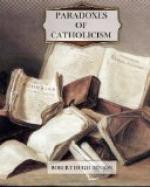(ii) Turn now to the Catholic Church. Here is a Society whose function it is to preserve and apply the teaching of Christ; to analyze it and to state it in forms or systems which every generation can receive. For this purpose, then, she draws up not merely a Creed—which is the systematic statement of the Christian Revelation—but disciplinary rules and regulations that will make this Creed and the life that is conformable to it more easy of realization, and all this she does with the express object of enabling the individual soul to respond to her spiritual environment and to rise to the full exercise of her powers and rights. As the scientist and the statesmen take, respectively, the great laws of nature and society and reduce them to rules and codes, yet without adding or taking away from these facts, that are true whether they are popularly recognized or not—and all with the purpose not of diminishing but of increasing the general liberty—so the Church, divinely safeguarded too in the process, takes the Revelation of Christ and by her dogma and her discipline popularizes it, so to speak, and makes it at once comprehensible and effective.
What, then, is this foolish cry about the slavery of dogma? How can Truth make men anything except more free? Unless a man is prepared to say that the scientist enslaves his intellect by telling him facts, he dare not say that the Church fetters his intellect by defining dogma. Christ did not condemn the Pharisaic system because it was a system, but because it was Pharisaic; because, that is, it was not true; because it obscured instead of revealing the true relations between God and man; because it made the Word of God of none effect through its traditions.
But the Catholic system has the appearance of enslaving men? Why yes; for the only way of aiming at and using effectively the truth that makes us free is by bringing into captivity every understanding to the obedience of Christ.
VIII
CORPORATENESS AND INDIVIDUALISM
He that shall lose his life for My sake shall find it. For what doth it profit a man if he gain the whole world and suffer the loss of his own soul?—MATT. XVI. 25, 26.
No recorded word of our Lord better illustrates than does this the startling and paradoxical manner of His teaching. For He Who knew what was in man, Who spoke always down to man’s deepest interests, dwelt and spoke therefore in that realm of truth where man’s own paradoxical nature is most manifest; where his interests appear to flourish only by being ruthlessly pruned; where he rises to the highest development of self only by self-mortification. This is, in fact, the very lesson Christ teaches in these words. To find the life is the highest object of every man and the end for which he was created; yet this can be attained only by the losing of it for Christ’s sake. Individuality can be preserved only by the sacrifice of Individualism. Let us break up this thought and consider it more in detail.




